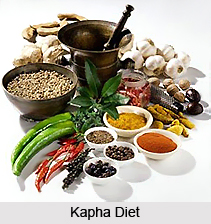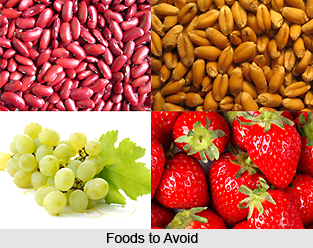 Ayurveda states that a person should choose his diet depending on his dosha. People with a predominant kapha dosha are often overweight and have high muscle development. They are prone to weight gain. These kinds of people mostly have clear, fair or pale complexion with oily, thick and wavy hair. Their teeth are strong, white and well formed. So, a person in whom the Kapha dosha is dominant should eat diet, which will pacify the Kapha dosha.
Ayurveda states that a person should choose his diet depending on his dosha. People with a predominant kapha dosha are often overweight and have high muscle development. They are prone to weight gain. These kinds of people mostly have clear, fair or pale complexion with oily, thick and wavy hair. Their teeth are strong, white and well formed. So, a person in whom the Kapha dosha is dominant should eat diet, which will pacify the Kapha dosha.
Foods to Include in Diet
To pacify Kapha one should eat small amounts of food and should go for Vata dosha aggravating foods. Foods, which have a pungent, bitter or astringent taste, can also be consumed.
Foods, which are dry, hot and sharp can be taken, puffed cereals such as puffed rice or corn and grains like millets, barley, corn, rye, and buckwheat can be eaten. Chapattis without butter, oil or ghee and plain dry roasted bread is beneficial for such people. Beans like mung beans, tofu, and lentils should also be a part of the diet.
For such persons, it is better to eat green leafy vegetables. Vegetables like asparagus, beets, broccoli, brussel sprouts, cabbage, carrots, celery, peas, eggplant, lettuce, bell peppers, radish, spinach, and zucchini can be helpful. Fruits like, apples, pears, apricots, cherries, peaches, pomegranates, papaya and dried fruits like figs, apricots and raisins are good for such person.

Beverages like warm drinks, herbal and spice teas, fruit and vegetable juice ensure medicinal help. Spices like garlic and ginger, turmeric and chillies can help to remove Kapha dosha in terms of unwanted mucus from the body.
Foods to Avoid
Foods, which aggravate Kapha, are dairy product, wheat, oils and avocados. Sweet products like deserts, deeply fried foods, salty and heavy food aggravate Kapha. Excess salt also increases Kapha dosha. Vegetables having too much water within them and sweet juicy fruits also aggravate Kapha dosha. For example, vegetables like cucumbers, avocado, cauliflower, corn pumpkin, mushroom, sweet potatoes, tomatoes, and brinjal are to be avoided completely. Fruits such as banana, citrus, dates, coconut, figs, grapes, mangoes, melons, pineapple, plums, rhubarb, and strawberries should be strictly removed from the diet.
Grains like oats, rice, wheat and pasta should be avoided. Beans like kidney beans and chick peas should not be consumed. Beverages specially carbonated drinks, cold or iced drinks, coffee, tea, and alcohol should be replaced with the right food.




















